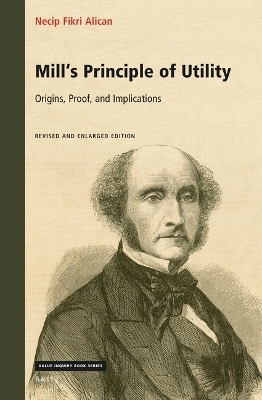
Mill's Principle of Utility: Origins, Proof, and Implications
Brill (Verlag)
978-90-04-50387-8 (ISBN)
Mill’s Principle of Utility: Origins, Proof, and Implications is a defense of John Stuart Mill’s utilitarianism with a particular emphasis on his proof of the principle of utility. Supplemented by a comprehensive historical background as well as salient philosophical assumptions and implications, its primary contribution is an analysis, interpretation, and defense of the controversial proof, which has yet to attract a scholarly consensus on how it works and whether it succeeds. The overarching aim of the book is the vindication of Mill’s reasoning in the proof and the restoration of his reputation as one of the clearest thinkers of his time.
Necip Fikri Alican, Ph.D. (1994), Washington University in St. Louis, specializes in ethics and metaphysics. His recent publications include One over Many: The Unitary Pluralism of Plato’s World (2021) and Quine on Ethics: The Gavagai of Moral Discourse (2021).
Foreword
Preface
Acknowledgments
A Note on References
Introduction
part 1
Mill’s Principle of Utility and Scholarly Reactions to His Proof: Exegetical and Historical Background
1 Classical Utilitarianism before John Stuart Mill: The Legacy of Jeremy Bentham
1.1 History of Utilitarianism: Sources and References
1.2 Bentham as an Anchor for Historical Insight
1.3 Origins and Development of Utilitarian Nomenclature
1.4 Bentham’s Debt to Predecessors and Contemporaries
1.5 Patterns of Indirect Inspiration and Transmission
1.6 Bentham’s Own Terminological Predilections
2 The Nature and Function of Mill’s Principle of Utility
2.1 What Is Bentham’s Principle of Utility?
2.2 What Is Mill’s Principle of Utility?
2.3 The Multiple Functions of Mill’s Principle of Utility
2.3.1 PU1: Theory of Value
2.3.2 PU2: Theory of Obligation
2.3.3 PU3: Theory of Justification
2.4 Mill’s Apparent Definitions of the Principle of Utility
2.5 The Primary Function of Mill’s Principle of Utility
2.6 The Structure of Mill’s Proof of the Principle of Utility
3 The Historical Reception of Mill’s Proof of the Principle of Utility
3.1 John Grote: An Examination of the Utilitarian Philosophy
3.2 Henry Sidgwick: The Methods of Ethics
3.3 Francis Herbert Bradley: Ethical Studies
3.4 William Ritchie Sorley: The Ethics of Naturalism: A Criticism
3.5 John Dewey: Outlines of a Critical Theory of Ethics
3.6 John Dewey and James Hayden Tufts: Ethics
3.7 John Stuart Mackenzie: A Manual of Ethics
3.8 George Edward Moore: Principia Ethica
part 2
The Alleged Fallacies in Mill’s Proof of the Principle of Utility: Analysis and Response
4 The Alleged Fallacy of Equivocation in Mill’s Proof
4.1 Charges against Mill
4.2 Analysis of the Charges
4.2.1 False Discount Factor in Critical Evaluation
4.2.2 Multiple Interpretations of “Desirable”
4.2.3 Alternative Formulations of Mill’s Argument
4.3 Response to the Charges
4.3.1 The Principle of Charity in Critical Evaluation
4.3.2 The Methodology behind Mill’s Proof
4.3.3 Desires as Evidence of Desirability
4.3.4 Distinction between Means and Ends
5 The Alleged Fallacy of Composition in Mill’s Proof
5.1 Charges against Mill
5.2 Analysis of the Charges
5.2.1 First Scenario
5.2.2 Second Scenario
5.2.3 Third Scenario
5.2.4 Fourth Scenario
5.3 Response to the Charges
5.3.1 Deconstruction of the Fallacy of Composition
5.3.2 Mill’s Conception of the General Happiness
5.3.3 Mill’s Conception of the Aggregate of All Persons
5.4 Critical Summary of the Response
6 The Alleged Naturalistic Fallacy in Mill’s Proof
6.1 Moore’s Broad Construal of the Naturalistic Fallacy
6.2 The Naturalistic Fallacy Anchored to the Good
6.3 The Alleged Naturalistic Fallacy in Mill’s Proof
part 3
Mill’s Proof of the Principle of Utility: Reconstruction and Implications
7 Reconstruction of Mill’s Proof of the Principle of Utility
7.1 First Part of the Proof
7.1.1 The Logical Role of Emphasis on the General Happiness
7.1.2 The Moral Implications of Emphasis on the General Happiness
7.2 Second Part of the Proof
8 Implications of Mill’s Proof of the Principle of Utility
8.1 Implications for a Theory of Moral Obligation
8.2 Directions for Further Research
8.2.1 Act Utilitarianism vs. Rule Utilitarianism
8.2.2 Actual, Intended, and Foreseeable Consequences
8.2.3 Total and Average Happiness
Works Cited
Index
| Erscheinungsdatum | 21.01.2022 |
|---|---|
| Reihe/Serie | Value Inquiry Book Series / Philosophy, Literature, and Politics ; 366 |
| Verlagsort | Leiden |
| Sprache | englisch |
| Maße | 155 x 235 mm |
| Gewicht | 801 g |
| Themenwelt | Geisteswissenschaften ► Philosophie ► Ethik |
| Geisteswissenschaften ► Philosophie ► Geschichte der Philosophie | |
| Geisteswissenschaften ► Philosophie ► Philosophie der Neuzeit | |
| ISBN-10 | 90-04-50387-0 / 9004503870 |
| ISBN-13 | 978-90-04-50387-8 / 9789004503878 |
| Zustand | Neuware |
| Informationen gemäß Produktsicherheitsverordnung (GPSR) | |
| Haben Sie eine Frage zum Produkt? |
aus dem Bereich


